|
Printables |
PowerPoints |
Online exercises |
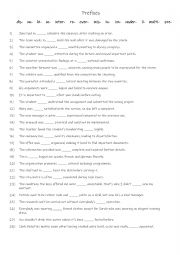
|
B1-B2 Prefixes (1)
Students read the sentences, then complete the gap-fill with the correct prefix using one of the following: dis-un- bi- co- inter- re- over- mis- in- im- under-il- multi-pre-. Answers on page 2.
Level: intermediate
Age: 12-100
Type:
Downloads: 115
|
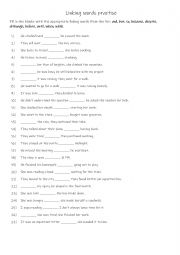
|
A2+-B1+ Linking words practise
Students look at the type of linking words in bold, then read the sentences and complete the gap-fill with one of the following conjunctions:and, but, so, because, despite, although, before, until, when & while. Answers on page 2.
Level: intermediate
Age: 8-100
Type:
Downloads: 115
|
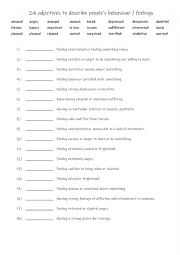
|
B1-B2 24 adjectives to describe people�s behaviour / feelings
Students familiar themselves with the adjectives in bold, which ones are positive or negative. Then they read the definitions and write the according adjective on the line provided. This worksheet could also be used as a speaking reinforcement activity for pairs and small groups, What do you do when you feel ______? What makes you ________? Etc. ...
Level: intermediate
Age: 9-100
Type:
Downloads: 115
|
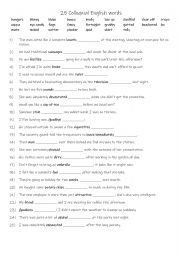
|
B1+ - C1 25 colloquial English words and their counterparts
Students learn colloquial vocabulary which is commonly used in everyday conversation. Students familiarise themselves with the 25 words and their meanings. Then they read the sentences to see which one could replace the more formal ones in bold font by writing that word on the given line. Answers on page 2.
Level: advanced
Age: 10-100
Type: worksheet
Downloads: 115
|
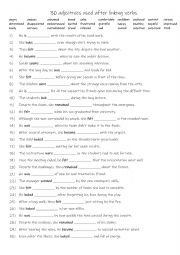
|
B1-B2 30 adjectives used after linking verbs
Learning adjectives used after linking verbs is important because they help describe or provide more information about the subject of a sentence, making communication clearer and more precise. These adjectives often express qualities, conditions, or states of being, and are essential for forming meaningful descriptions, like "She seems tired" or "T...
Level: intermediate
Age: 9-100
Type:
Downloads: 115
|
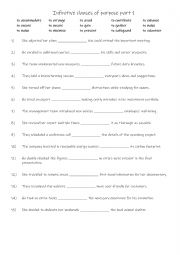
|
B1+-B2 15 infinitive clauses of purpose Part 1
Infinitive Clauses of Purpose are used to explain the reason for or purpose of an action. These clauses are often introduced by the infinitive form of the verb ("to" + verb) and provide clarity and directness to communication. Learning to use infinitive clauses correctly helps you express intentions in a precise and formal manner. Infinitive clause...
Level: intermediate
Age: 10-100
Type:
Downloads: 115
|
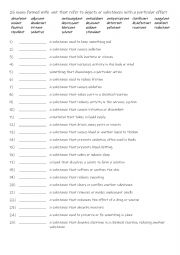
|
B1+-C1 25 nouns formed with -ant that refer to objects or substances with a particular effect
Learning nouns like absorbent, antioxidant, coolant, deodorant, and stimulant is valuable because they describe substances with specific roles in chemical, medical, and everyday contexts. These terms help us identify the functions of various products, such as deodorants for personal care or disinfectants for hygiene, and convey properties like prev...
Level: intermediate
Age: 10-100
Type:
Downloads: 115
|
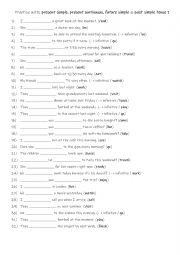
|
A1+-A2 Practise with present simple, present continuous, future simple & past simple tense 1
Students should learn and practice the present simple, present continuous, future simple, and past simple tenses at the A1+-A2 level because these tenses are essential for everyday communication, such as discussing routines, ongoing activities, past events, and simple future plans. They provide a solid foundation for learning more advanced grammar ...
Level: elementary
Age: 8-100
Type:
Downloads: 115
|
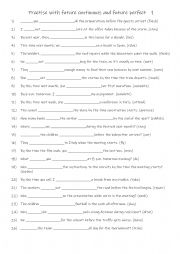
|
A2-B1 Practise with future continuous and future perfect 1
Students should practise the future continuous and future perfect because these tenses enable precise communication about future events. The future continuous describes ongoing actions at a specific time in the future, such as "I will be preparing dinner at 7 p.m. tomorrow," helping students discuss future activities in progress. The future perfect...
Level: elementary
Age: 9-100
Type:
Downloads: 115
|
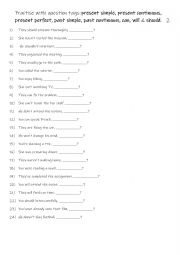
|
Practise with question tags: present simple, present continuous, present perfect, past simple, past continuous, can, will & should. 2
Learning question tags with various tenses (such as Present Simple, Present Continuous, Present Perfect, Past Simple, Past Continuous, Can, Will, and Should) helps students communicate more naturally and confidently in English. Question tags are used to confirm information or seek agreement, making conversations smoother and more engaging. Practici...
Level: intermediate
Age: 10-100
Type:
Downloads: 115
|
|
|
|
|












